BBC:
Fifty years after the war, Vietnam faces a new US threat: tariffs
7 hours ago
Rupert Wingfield-Hayes
Rupert Wingfield-Hayes
Reporting from Ho Chi Minh City
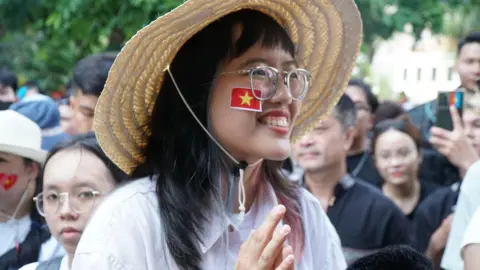
BBC/ Lulu Luo
Tung Linh, a 20-year-old Vietnamese college student, says she is excited for Vietnam's future
On a searing afternoon in Vietnam, Tung Linh declared she "basically knows nothing" about the bloody, decades-long war that pitted her country's Communist-run North against the United States-backed South.
"My grandparents fought in the war and because of that today we can look at the sky and see an airplane and we don't feel scared, like they did," says the 20-year-old college student.
Stuck to her right cheek was a little yellow star on a red rectangle - the Vietnamese flag. Like her, Ho Chi Minh City, where she lived, was gearing up to celebrate the 50th anniversary of the end of the war, when the Communists triumphed.
Today's Vietnam is a remarkably different country than the one American troops withdrew from in defeat – it's enterprising, it's growing fast and it's getting richer.
Its authoritarian Communist leadership has embraced capitalism. They aspire to follow in China's footsteps, and have ploughed money and effort into becoming a reliable manufacturing hub, even an alternative to China.
But that is a risky ambition during US President Donald Trump's trade war – it's partly why he is threatening a 46% levy against the South East Asian nation. That could shatter the country's economic potential.
Vietnam was a French colony, a Chinese vassal and for 20 years, the proxy battlefield in America's bloody struggle to stop China spreading communism across South East Asia.
But it cannot escape its geography. Nestled beneath China's wide rump, it is once again on the frontline in a new American battle –which hopes to stem Beijing's rise as an economic superpower.
Vietnam is a young country in a hurry. The median age is 33, considerably younger than Thailand or China (40), and far younger than Japan (50).
"I want to do a job that will bring more success to Vietnam," said Linh in fluent English. She is studying economics and marketing. "And yes, success for me too," she admits, with a smile, when prodded.
It's a dream that suits her bustling city – now a sprawling metropolis of 10 million people, Ho Chi Minh City has the same choking traffic, glass-clad skyscrapers, five-star hotels, restaurants and seedy massage parlours as any Asian mega city.
You would be hard put to find traces of the socialist ideology that led to the city's capture in 1975, when it was the capital of South Vietnam. The victors renamed it city Ho Chi Minh, after the revolutionary father of North Vietnam. But to locals, it is still Saigon.
And when it fell on this day 50 years ago, South Vietnam ceased to exist as North Vietnamese tanks smashed through the tall iron gates of the presidential compound and raised the red flag with a yellow star over the presidential palace.
America's ally, the southern regime, was vanquished. Its last president had fled the previous day. More than two decades of bitter conflict was over.
The victory had come at an enormous cost. An estimated three million dead and millions more injured. Between 1968 and 1975, a greater tonnage of bombs was dropped on this slender piece of land than in all theatres in World War Two.
Advertisement
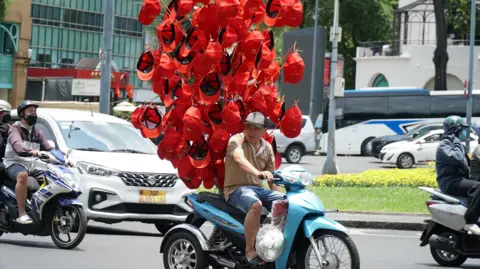
Tung Linh, a 20-year-old Vietnamese college student, says she is excited for Vietnam's future
On a searing afternoon in Vietnam, Tung Linh declared she "basically knows nothing" about the bloody, decades-long war that pitted her country's Communist-run North against the United States-backed South.
"My grandparents fought in the war and because of that today we can look at the sky and see an airplane and we don't feel scared, like they did," says the 20-year-old college student.
Stuck to her right cheek was a little yellow star on a red rectangle - the Vietnamese flag. Like her, Ho Chi Minh City, where she lived, was gearing up to celebrate the 50th anniversary of the end of the war, when the Communists triumphed.
Today's Vietnam is a remarkably different country than the one American troops withdrew from in defeat – it's enterprising, it's growing fast and it's getting richer.
Its authoritarian Communist leadership has embraced capitalism. They aspire to follow in China's footsteps, and have ploughed money and effort into becoming a reliable manufacturing hub, even an alternative to China.
But that is a risky ambition during US President Donald Trump's trade war – it's partly why he is threatening a 46% levy against the South East Asian nation. That could shatter the country's economic potential.
Vietnam was a French colony, a Chinese vassal and for 20 years, the proxy battlefield in America's bloody struggle to stop China spreading communism across South East Asia.
But it cannot escape its geography. Nestled beneath China's wide rump, it is once again on the frontline in a new American battle –which hopes to stem Beijing's rise as an economic superpower.
Vietnam is a young country in a hurry. The median age is 33, considerably younger than Thailand or China (40), and far younger than Japan (50).
"I want to do a job that will bring more success to Vietnam," said Linh in fluent English. She is studying economics and marketing. "And yes, success for me too," she admits, with a smile, when prodded.
It's a dream that suits her bustling city – now a sprawling metropolis of 10 million people, Ho Chi Minh City has the same choking traffic, glass-clad skyscrapers, five-star hotels, restaurants and seedy massage parlours as any Asian mega city.
You would be hard put to find traces of the socialist ideology that led to the city's capture in 1975, when it was the capital of South Vietnam. The victors renamed it city Ho Chi Minh, after the revolutionary father of North Vietnam. But to locals, it is still Saigon.
And when it fell on this day 50 years ago, South Vietnam ceased to exist as North Vietnamese tanks smashed through the tall iron gates of the presidential compound and raised the red flag with a yellow star over the presidential palace.
America's ally, the southern regime, was vanquished. Its last president had fled the previous day. More than two decades of bitter conflict was over.
The victory had come at an enormous cost. An estimated three million dead and millions more injured. Between 1968 and 1975, a greater tonnage of bombs was dropped on this slender piece of land than in all theatres in World War Two.
Advertisement

BBC/ Lulu Luo
Vietnam's Ho Chi Minh City...
Vietnam's Ho Chi Minh City...
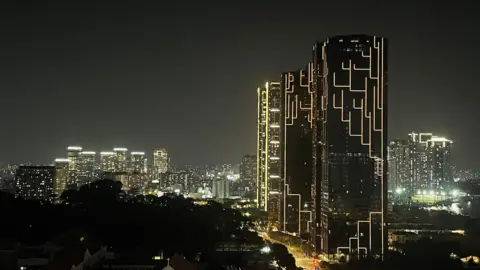
BBC/ Lulu Luo
...is a sign of the country's ambitious economic agenda
Advertisement
But few here want to talk about the war even as they celebrate the anniversary of their "reunification".
Linh and her friends screamed in delight as a truck carrying soldiers drove past. The shy idols waved back – they were on their way to the barracks after rehearsals for the anniversary parade.
"I am excited because this is the day when we reunited, when we became one country again," Linh said.
Her answer sounded a little rehearsed, not least because of the government-appointed minder who accompanied the BBC throughout. But her enthusiasm for her future – and her country's - is not uncommon.
A little further down the road, 18-year-old Minh, who did not want to share her last name, told us she was studying to be a lawyer so she could "become successful". With a laugh, she added: "And rich!"
When we asked about how young people feel about Americans, the minder winced visibly and tried to stop her answering.
"We're not angry," she says. "We don't hate them. That was the past. Now we want to trade with America. You know globalisation? We want to learn from America."
Vietnam's new leaders appear to have the same ambition. In January the country's new Communist party chief, To Lam, embarked on a program to slash bureaucracy that could impress Elon Musk, who has been overseeing the Trump administration's controversial cost-cutting team.
The country's 63 provinces and municipalities are being reduced to 34, and government ministries and agencies cut from 30 to 17. This year, 100,000 government employees are being laid off, according to official estimates.
...is a sign of the country's ambitious economic agenda
Advertisement
But few here want to talk about the war even as they celebrate the anniversary of their "reunification".
Linh and her friends screamed in delight as a truck carrying soldiers drove past. The shy idols waved back – they were on their way to the barracks after rehearsals for the anniversary parade.
"I am excited because this is the day when we reunited, when we became one country again," Linh said.
Her answer sounded a little rehearsed, not least because of the government-appointed minder who accompanied the BBC throughout. But her enthusiasm for her future – and her country's - is not uncommon.
A little further down the road, 18-year-old Minh, who did not want to share her last name, told us she was studying to be a lawyer so she could "become successful". With a laugh, she added: "And rich!"
When we asked about how young people feel about Americans, the minder winced visibly and tried to stop her answering.
"We're not angry," she says. "We don't hate them. That was the past. Now we want to trade with America. You know globalisation? We want to learn from America."
Vietnam's new leaders appear to have the same ambition. In January the country's new Communist party chief, To Lam, embarked on a program to slash bureaucracy that could impress Elon Musk, who has been overseeing the Trump administration's controversial cost-cutting team.
The country's 63 provinces and municipalities are being reduced to 34, and government ministries and agencies cut from 30 to 17. This year, 100,000 government employees are being laid off, according to official estimates.
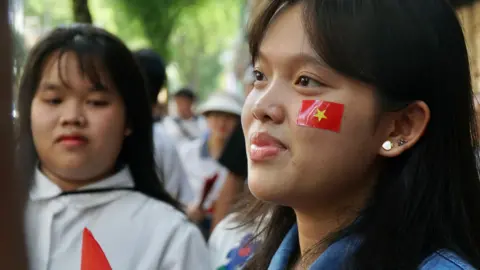
BBC/ Lulu Luo
Vietnam's ambitions are mirrored in its young people, like 18-year-old Minh
The ambition is huge. So far only one country in South East Asia, Singapore, has managed to escape the "middle-income trap", where economic growth slows before countries become rich. Vietnam, whose economy is growing at a steady 5%, intends to be the second. It has flung its doors wide open to investment – and is welcoming back those it once drove from its shores.
After the 1975 victory around two million southern Vietnamese fled the country. Many were ethnic Chinese. They packed on to flimsy boats and set out across the South China Sea. They became known as "the boat people". Today their descendants make up a diaspora of nearly six million stretching from the United States and Canada to France, Germany, Japan and Taiwan.
"Since 2017, I have promoted many Taiwanese companies to invest in Vietnam, and I myself am an advisor to several large electronics companies that I brought here," said Lisa Wu, who was born in Saigon but spent three decades in Taiwan. Now she is back.
"The most attractive thing is that the Vietnamese government is very supportive. The electronics industry is expanding out of China and a lot will choose Vietnam."
It's no coincidence this shift began around 2018, when Trump declared his first trade war against China.
Two young businesswomen from southern China, who did not want to share their names, tell us they have spent the last two years setting up a shoe factory here: "Now it's ready to go."
They plan to export to the US. They are concerned about the possibility of higher tariffs for Vietnam - it currently faces a 10% levy, like most of the world – but "it's a lot better here than China", they say with a laugh. Chinese imports to the US face a range of tariffs that go up to 245% for some goods.
Vietnam's ambitions are mirrored in its young people, like 18-year-old Minh
The ambition is huge. So far only one country in South East Asia, Singapore, has managed to escape the "middle-income trap", where economic growth slows before countries become rich. Vietnam, whose economy is growing at a steady 5%, intends to be the second. It has flung its doors wide open to investment – and is welcoming back those it once drove from its shores.
After the 1975 victory around two million southern Vietnamese fled the country. Many were ethnic Chinese. They packed on to flimsy boats and set out across the South China Sea. They became known as "the boat people". Today their descendants make up a diaspora of nearly six million stretching from the United States and Canada to France, Germany, Japan and Taiwan.
"Since 2017, I have promoted many Taiwanese companies to invest in Vietnam, and I myself am an advisor to several large electronics companies that I brought here," said Lisa Wu, who was born in Saigon but spent three decades in Taiwan. Now she is back.
"The most attractive thing is that the Vietnamese government is very supportive. The electronics industry is expanding out of China and a lot will choose Vietnam."
It's no coincidence this shift began around 2018, when Trump declared his first trade war against China.
Two young businesswomen from southern China, who did not want to share their names, tell us they have spent the last two years setting up a shoe factory here: "Now it's ready to go."
They plan to export to the US. They are concerned about the possibility of higher tariffs for Vietnam - it currently faces a 10% levy, like most of the world – but "it's a lot better here than China", they say with a laugh. Chinese imports to the US face a range of tariffs that go up to 245% for some goods.
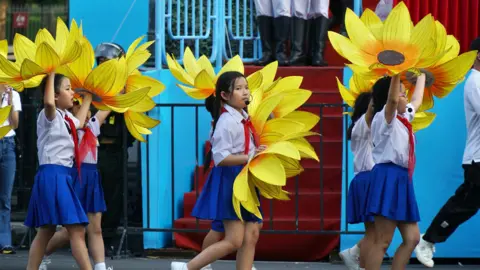
BBC/ Lulu Luo
Vietnam is celebraring 50 years of independence, and of the end of the war
Still, Vietnam is feeling the impact, Ms Wu said. "I had several factories preparing to begin operations here this May. But because of the policy change, all have stopped and everyone is waiting."
Vietnam is again being asked to choose – America or China. But it's not a choice it can or will make because it needs both.
Less than two weeks ago, they rolled out the red carpet to welcome Chinese leader Xi Jinping in the capital Hanoi. Warm words were spoken of fraternal friendship and support. But relations with their big neighbour are trickier than they may appear. For years, Vietnam has walked a tightrope between Washington and Beijing – the latter's expansive ambitions can be a threat to neighbours, especially growing economies that are keen to woo US businesses.
As Vietnam insists on "looking forward", it appears to have almost forgotten the men and women who fought in the jungles and through the hell of American bombs.
But even they say there must be no return to the past. "I used to have a scar here," says Le Thanh Gian, pointing to his right hand, where a bullet had once lodged.
"There are still some pieces of shrapnel in my body that couldn't be removed. There were battles where it seemed like we would all be killed. But some of us survived while others fell."
But he says he bears no anger anymore.
"We must have peace. We have already made a lot of progress. People's lives are more prosperous and fulfilled. Now we must work together with the Americans for the future."
Vietnam is celebraring 50 years of independence, and of the end of the war
Still, Vietnam is feeling the impact, Ms Wu said. "I had several factories preparing to begin operations here this May. But because of the policy change, all have stopped and everyone is waiting."
Vietnam is again being asked to choose – America or China. But it's not a choice it can or will make because it needs both.
Less than two weeks ago, they rolled out the red carpet to welcome Chinese leader Xi Jinping in the capital Hanoi. Warm words were spoken of fraternal friendship and support. But relations with their big neighbour are trickier than they may appear. For years, Vietnam has walked a tightrope between Washington and Beijing – the latter's expansive ambitions can be a threat to neighbours, especially growing economies that are keen to woo US businesses.
As Vietnam insists on "looking forward", it appears to have almost forgotten the men and women who fought in the jungles and through the hell of American bombs.
But even they say there must be no return to the past. "I used to have a scar here," says Le Thanh Gian, pointing to his right hand, where a bullet had once lodged.
"There are still some pieces of shrapnel in my body that couldn't be removed. There were battles where it seemed like we would all be killed. But some of us survived while others fell."
But he says he bears no anger anymore.
"We must have peace. We have already made a lot of progress. People's lives are more prosperous and fulfilled. Now we must work together with the Americans for the future."
There is more , a lot more to relations than tariffs.
ReplyDeleteThe article totally ignored the Paracels and the Spratlys, both of which 5,000 year old Bully wants to Gasak...but Vietnam does not recognise their claim.
Yanks don't want a single inch of Vietnamese soil, and Vietnamese know that.
Just remove the tariff and non-tariff barriers unwisely placed against goods from your biggest export market.
Viets millions killed, land devastated by bombings and AGENT Orange, women humiliated as sex slaves, massacres a la My Lai, Phoenix PROGRAM OF ASSASSINATIONS, ETC ETC ETC - that's what the wankees did to the Viets, unforgiveable sins and crimes and atrocities
DeleteSame can be said for Germans, Yapanese, Vietnamese… bombings, nukes, rape, mustard gas etc. But today they are friendly and trade with those who did these things to them and have MOVED ON.
DeleteMOVED ON?
DeleteNo one has any right to sublimated one's excuse as the forgiveness given by the sacrificed victims in any war!
Doggie, excepted.
Even the former soldier said:
ReplyDelete"(I) bear no anger anymore. We must have peace. We have already made a lot of progress. People's lives are more prosperous and fulfilled. Now we must work together with the Americans for the future."
Well said. Now we wait for Ishmael to say the same thing to Isaac. It's all up to him.
Jaops, Germans, Russians, Viets, everyone has a homeland - where's is the Palestinians'?
DeleteJordan
DeleteToday, 2 million Ishmaels live peacefully with FULL RIGHTS to be Muslim (or not), straight (or not) in Isaac-land. They can call themselves whatever pronouns they like, eg “Palestinians” if they want. They are still living in their grandfathers house in Haifa and running the family cobbler business.
DeleteLike the Chinese family in Rawang, now citizens of Bolehland, peacefully living in their grandfathers house and running the family pig farm. They still call themselves CHINESE, but hold Bolehland Passport. They don’t want to live in Old Bullyland. They have MOVED ON.
mfer, why can't yr beloved Isaac to say the same thing to Ishmael . It's all up to him.
DeleteBetter still ship, log, stock & barrel out from the land their fairytale ancestors loses long long time ago.
Or yr mfering claimed 'rules of war' DON'T apply to the zionist state?
Millions of “Palestinians” now live in Jordan, they have Jordanian citizenship, one of them married the King. Millions more live in Israel, are Israeli citizens, enjoy full rights. So, they already have TWO HOMELANDS. They were given a third, GAZA, but instead of building a Singapore or Dubai, they chose to continue waging war. So the suffering is on them, it’s their choice.
DeleteMillions of Chinese and Yindians now live in MALAY-SIA, consider it HOME, and have citizenship. A few still pine and whine about their past homeland but 99% are happy and have MOVED ON.
Jordan
DeleteChoice!
DeleteU know choice?
Jordanians r Jordanians. So too the M'sians, despite all those racial ceilings.
None have moved on. It's just a choice bestowed upon many of them.
The Palestinians want their OWN country built on their OWN homeland. PERIOD.
The zionists r rejects from their earlier adopted countries in old Europe. They r now forcefully occupying Palestine to recreate their grandmother's fairytale nation. They have NO right of residency. Neither any sovereignty right despite their current military advantages. Once those outside supported military aids die up, it would be another episode of Judas exodus!
Mfering lies!
ReplyDeleteThe Paracel and Spratly Islands are two archipelagos in the South China Sea that are the center of a long-standing territorial dispute involving China, Taiwan, Vietnam, the Philippines, and other nations.
No mentioned of all those other nations!
BTW, most of the The Paracel and Spratly Islands are ALREADY occupied by China, with or without Vietnam approval.
Indeed, there is more , a lot more to relations than tariffs. Even though the Yank don't want a single inch of Vietnamese soil, but it definitely wants a subservient Vietnam that abiding by its wishes!
W/O the imported parts from China to make most of Vietnam's exports to US, there will be NO products to sell.
& yet US is Vietnam's biggest exports destination.
A dilemma of choosing between rock and a hard place!